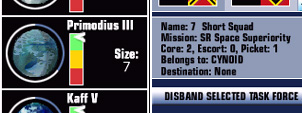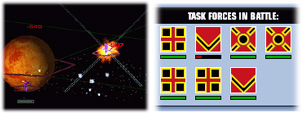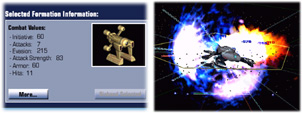Now that the fiasco that is Master of Orion 3 is out, a lot of people seem to be asking how it could possibly have ended up as such a mess. The game is more than just micromanagement Hell – it’s micromanagement Hell where someone else (the AI) does the initial micromanagement and you then have to go back in and micromanage the mistakes. Totally, completely nuts. Or is it? If you look at all the game’s pieces, you can clearly see the spectacular evidence of failed game design that eventually exploded. It all makes sense, and I’m surprised that Tom didn’t recognize it in his review. After all, the key piece of evidence is on his own website.

I’ve always agreed with the game design theory that anything below the level of the player’s control should be abstracted. The original Master of Orion did this beautifully. Each planet had a slider that let you set what proportion of a system’s resources went for what purpose. How many organic robots were really working in the Cryslon system when you set the Industry slider to 57%? Who cares. Their hopes, dreams, love lives, and need to go to the bathroom were all abstracted into some percentage of the planet’s overall capacity, which you controlled directly.
This kind of obsessive micromanagement can obviously devolve into spreadsheet optimization. One way of getting around this is to design a system where everything is theoretically under your control, but your ability to get involved in the details is somehow limited. This is what some real-time strategy games do when they force you to micromanage every single unit. At some point, you have to concentrate on the most important units. Choosing where to focus your attention becomes part of the strategy. It’s also frustrating because if you have to get involved in the first place, the unit AI has to be bad. It’s a cheap gameplay tactic, although it does technically work.
In a Tito-esque Third Way of Game Design, what if you could create a system in which the AI was just fine, but you sometimes had to get involved anyway because what it was doing, while it made sense, wasn’t what you wanted? And what if you couldn’t always get involved, because your ability to do so was limited by something other than a frustrating inability to click fast enough?

From everything I’ve read about Master of Orion 3’s development, this is exactly what Imperial Focus points were supposed to do. Designer Alan Emrich said as much in an interview posted on this very site:
Imperial Focus is the Leader’s ability to get things done during a single one-to-two year Game Turn. During a turn a Leader can only focus on so many issues. To simulate this, each player has only so much Imperial Focus each turn. With it, he or she reviews the current standing orders throughout the Empire and spends Imperial Focus Points (IFPs) only when he or she wants to change the status quo. With Imperial Focus, the player can choose to do anything but cannot do everything.
You could still design a system like in the original Master of Orion, where everything was still very abstract. Simply add a restriction where you could only change a certain number of sliders per game turn. However, this would feel artificial (and very boardgamey) to computer gamers. To get around this, you would have to create some kind of game logic that justifies AI misbehavior. It would have to be a fully functioning universe of numbers that ran on its own logic, a logic that would make sense to the player, but not always coincide with his ambitions. To bend the game to his will, he would have to allocate his limited resources while it resisted his interference. It would be the first real empire simulation, where you’re the emperor and not just an omniscient super-being who can control every single planet in his dominion, down to whether the natives voluntarily starve themselves in order to build a battle station.
Sounds spectacularly ambitious, doesn’t it? That’s because it is. Making it work depends on creating an AI which can not only micromanage efficiently, but which is also aware of the overall game situation. The AI would have to be aware how actions it takes on behalf of some imaginary in-game special interest group might not fit into a player’s global strategy, but still make sense for role-playing reasons.

Imagine, for example, a viceroy who is managing a planet in some part of your empire where you’re generating a lot of trade income, thanks to nearby Klackon spaceports. You decide that there are some regions on some of these planets that need to be developed for industry, because you are going to be launching an attack on the Klackons. However, your viceroy sees that if he simply developed more Recreation and Spaceport DEA’s, he could increase his trade and thus make more money (some percentage of which was going into his pockets through graft). So he ignores your orders to build mines and factories, and builds amusement parks instead.
In a game with infinite micromanagement, you simply go to those planets, uncheck the viceroy box, assign the DEA’s yourself, curse the bad AI, and move on. But if your ability to intervene is limited by something like Imperial Focus Points, you have to decide: do I waste time straightening this guy out? Or do I ignore him and try to get the production points somewhere else? In a good design, each of these would have consequences: meddling with a popular viceroy who is enriching the worlds he controls through trade would anger the populace, who would resent imperial meddling at their expense; removing him outright may even trigger a revolt. Leaving him alone might embolden other viceroys to follow his lead, so that the more tolerant you get of disobedience, the less the AI follows your orders. If your viceroys had personalities like your leaders, it would be even better.
It may sound like this is just excusing bad AI, but as I said above, this whole thing is dependent on the AI doing things that make sense for role-playing reasons, which is another way of saying that you can explain them in game terms that don’t resort to “the viceroy is insane” or “the viceroy just likes building lots of transports but no troops to put in them.” Like the “favorable trade relations” example above: the planet is happy and is making money for everybody. Now you, the mean emperor, want it to start making warships to attack your trading partner. If you want to upset the status quo that much, you’re going to have to devote a lot of attention to this. You’re going to have to use a lot of Imperial Focus Points that you would otherwise have used to do other things.
In this case, note that abstraction works against you as a designer. I guarantee that no matter how well you justify it in scary role-playing terms, no player is going to be very happy when you move the Shipbuilding slider from 10% up to 60%, and the next turn it’s right back at 10%. It will seem artificial and broken. However, if you create a system that goes into enough detail where it is possible for the AI to partially follow your orders, you can get away with it.

This also explains game mechanics that seem like completely superfluous details. When doing research, you might run into a Project Overruns that cost money and time. In MOO3 as is it was released, this is just dumb. Since research is largely an automated process, the Project Overrun is just another way to rub the player’s nose in arbitrary events that he can do nothing about. But what if he could? You could spend IFP’s to overcome Project Overruns. If technology were a real priority at that time, you might have to forgo something else you were doing to get past this scientific speed bump. In that context, it makes perfect sense.
This also explains the constantly changing research allocation sliders. Being a scientist myself, I know that the best researchers are often the most independent ones. A hands-off research policy might see your allocation sliders jumping around all the time as your scientists followed whatever projects they felt like. This might yield the fastest results. But what if you want to lock those sliders down by holding guns to your scientists’ heads? Great. They’ll do what you say, but it will take a lot longer. In a well-designed game, there will be tough choices to make about when to get involved, because simply the act of getting involved will – you guessed it – require IFP’s. In the game as it was released, it’s just frustrating and pointless, because the removal of IFP’s invalidates the whole exercise. The original model was built on limited player intervention, but now you can micromanage all you want.
It’s possible that removing the IFP’s was simply the logical response to what had become a completely unplayable design. The problem is that as the game stands, it has one foot in this abandoned model, and one foot in empty space. The revised design did nothing except rip out the foundation for all the other game mechanics, many of which now appear kooky. Why have development plans at all, if you let the player control individual DEA’s? The answer is that the player was probably not supposed to control the DEA’s in the first place. This fits with the magnitude of the numbers involved in game calculation. There isn’t much difference between 3,778 production points and 3,771 production points because they weren’t mean to be optimized to this degree. You were just supposed to be able to tell if your viceroys were doing a good job or not. The numbers are there for evaluation, not calculation.
Likewise, the completely anonymous space combat model is incongruous precisely because you can micromanage so many other tiny details of the game. In a design where you’re constantly making interesting high-level decisions, it would have been micromanaged space combat that would have seemed out of place. Without IFP’s, the effect is the opposite.

It’s entirely possible that, as designed, the IFP mechanism simply didn’t work. It’s not hard to think of reasons for this happening: an inability to design competent and believably recalcitrant AI is just one of them. But it seems insane that a game designed around a single concept can take that concept out, but leave everything else that was based on that concept untouched. The bad AI, broken diplomacy, and ludicrously clumsy interface are all problems, and to some extent inexplicable. But in the context of Imperial Focus Points much of the rest of the design makes sense. It may have been incredibly ambitious and perhaps not feasible. It would certainly have been different. It could have been spectacular if it had worked. We’ll never know.
Discussion
Trackbacks/Pingbacks
[…] enjoy his specialties (strategy, military history, and wargames), it’s worth checking out! Bruce’s dissection of Master of Orion 3, from many years back, is still one of my favourite pieces of games writing […]